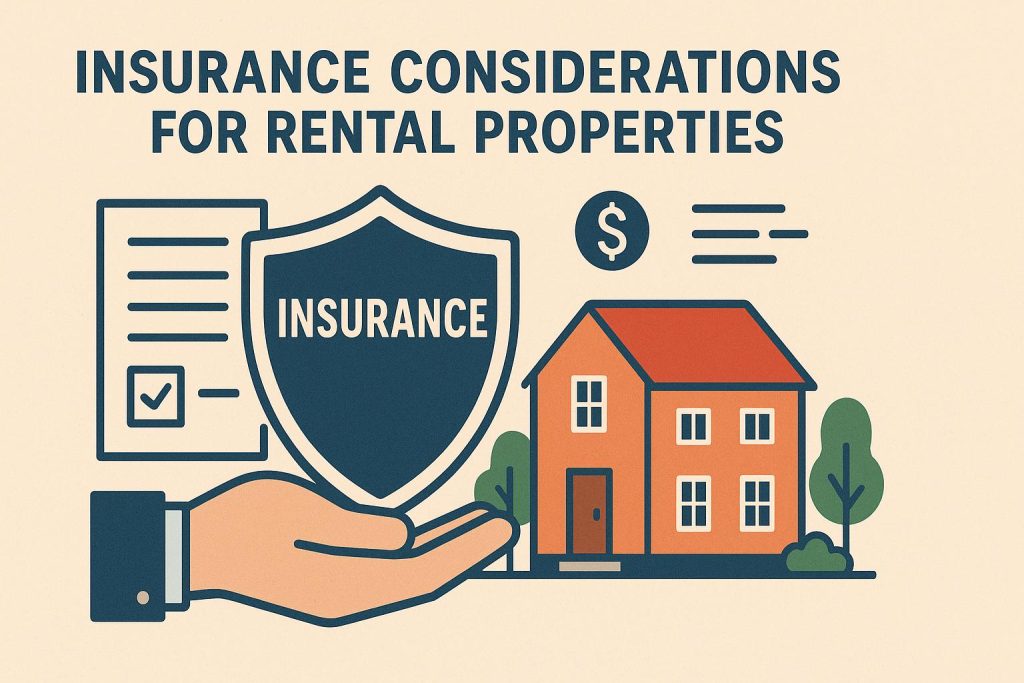Insurance considerations for rental properties

Understanding Insurance for Rental Properties
When you own rental property, an understanding of the right insurance to carry is crucial not only to protect your investment but also to effectively manage potential risks. Insurance for rental properties is distinct from standard homeowners insurance as it caters to the unique requirements and responsibilities of landlords, ensuring that both the property and landlord are adequately covered.
Types of Insurance Coverage
Dwelling Coverage: At the heart of rental property insurance is dwelling coverage, which is indispensable for safeguarding the structural integrity of your rental asset. This coverage is designed to protect against damage caused by unforeseen events like fire, storms, or vandalism. Although dwelling coverage shares similarities with the protection offered in a homeowners insurance policy, it is specifically crafted to address the nuances of rental properties, ensuring that the physical edifice of your rental is secure against various forms of damage.
Liability Coverage: Being a landlord means accepting certain liabilities for incidents that may occur on your property. Liability coverage is a pivotal component that shields you from the financial setbacks associated with legal costs or medical expenses in situations where a tenant or visitor suffers injuries, particularly if linked to potential negligence on your part. This insurance facet ensures that, should legal claims arise relating to accidents on your property, your financial interests are guarded.
Loss of Rental Income: Circumstances beyond your control, such as a fire, may render your property uninhabitable, resulting in a loss of income. Loss of rental income insurance is specifically intended to address such scenarios by reimbursing the potential rental income loss during the period the property undergoes necessary repairs. This ensures that unforeseen disruptions do not adversely impact your financial stability as a landlord.
Landlord Contents Insurance: While it is the tenant’s responsibility to insure their personal possessions, there may be items such as appliances or furniture that you, as a landlord, provide for tenant use. Landlord contents insurance is crucial in this context, as it protects these items against damages or losses. This particular coverage shields your assets located within the rental unit, ensuring that items you own and allow tenants to use are secured.
Additional Considerations
Tenant Verification and Lease Agreements: Protecting your investment also involves proper management practices like tenant verification and crafting comprehensive lease agreements. Ensuring thorough background checks on potential tenants helps mitigate risk, allowing you to screen for individuals who are likely to respect your property. Meanwhile, a detailed lease agreement clearly outlines the responsibilities of renters. By mitigating disputes and clarifying insurance coverage obligations, such agreements play a vital role in maintaining a harmonious landlord-tenant relationship.
Regular Property Maintenance: Key to an effective insurance strategy is regular property maintenance, which not only preserves the value of your rental asset but also satisfies insurance company requirements. Often, insurers may mandate proof of periodic maintenance either to issue policies or when processing claims. By keeping your property in optimal condition, you can prevent common incidents or damages, which positively influences your insurance premiums and ensures the continued safety and satisfaction of your tenants.
Working with an Insurance Agent
Collaborating with an experienced insurance agent can vastly facilitate the procurement of an insurance policy tailored to address the specific needs of your rental property. Insurance agents bring with them a wealth of knowledge regarding coverage nuances, premium rates, and procedural guidance during claims processes. They are equipped to demystify complex insurance concepts and help align your choices with both your needs and budget.
For those seeking more extensive insights into insurance requirements applicable in their locality, consulting with legal professionals or engaging with insurance experts is recommended. Furthermore, tapping into industry-specific resources or seeking out reputable local agencies can provide barriers of protection through informed counsel tailored to your precise circumstances.
Conclusion
Insurance stands as a critical pillar in the effective management of rental properties. A comprehensive understanding of the different types of coverage and additional considerations equips landlords with the tools needed to shield their investments while ensuring adherence to applicable legal mandates. With correctly structured insurance policies, landlords not only adeptly navigate potential risks but also maintain the viability and profitability of their rental endeavors. By grounding one’s approach in thorough knowledge and strategic collaborations, landlords can safeguard their properties and enjoy the numerous benefits that a well-managed rental business offers.
